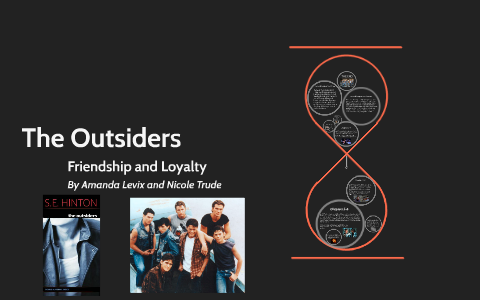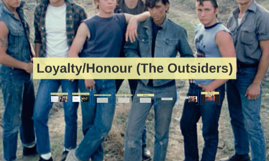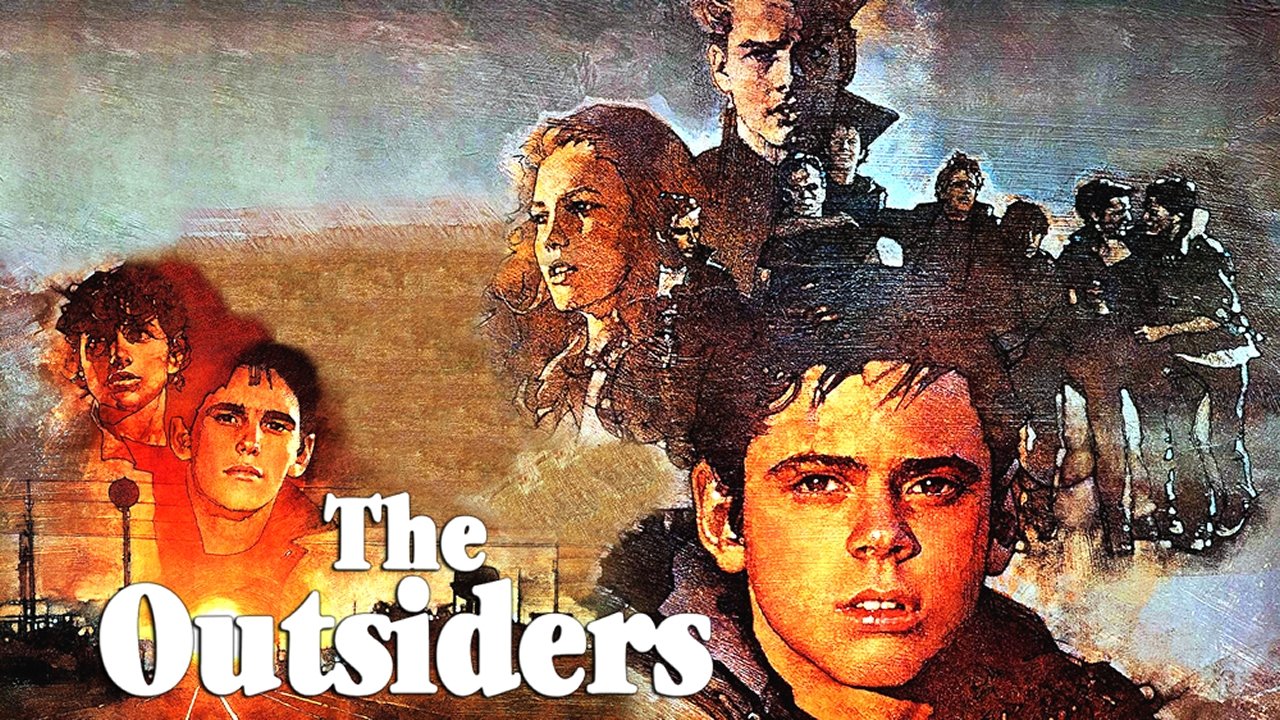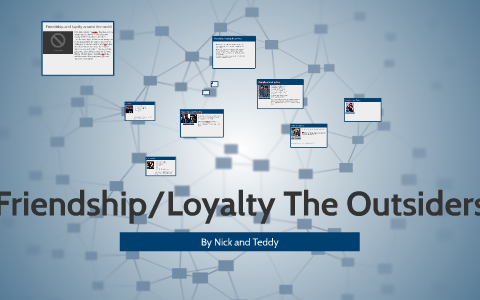Watching The Outsiders: A Timeless Exploration Of Class, Loyalty, And Loss
Watching the Outsiders: A Timeless Exploration of Class, Loyalty, and Loss
Associated Articles: Watching the Outsiders: A Timeless Exploration of Class, Loyalty, and Loss
Introduction
On this auspicious event, we’re delighted to delve into the intriguing subject associated to Watching the Outsiders: A Timeless Exploration of Class, Loyalty, and Loss. Let’s weave attention-grabbing data and supply recent views to the readers.
Desk of Content material
Watching the Outsiders: A Timeless Exploration of Class, Loyalty, and Loss

Francis Ford Coppola’s 1983 adaptation of S.E. Hinton’s The Outsiders is not only a coming-of-age story; it is a visceral expertise that lingers lengthy after the credit roll. Greater than only a teen drama, it is a highly effective exploration of social divisions, the complexities of loyalty, and the devastating penalties of violence, all filtered by way of the lens of youthful vulnerability and burgeoning maturity. Watching The Outsiders at the moment, a long time after its launch, reveals a movie that continues to be remarkably resonant, its themes tragically related even in a vastly modified world.
The movie instantly establishes its central battle: the simmering rigidity between the Greasers, a working-class gang, and the Socs (Socials), their prosperous counterparts. This is not a easy good versus evil dichotomy; Hinton’s novel, and Coppola’s adaptation, deftly keep away from such simplistic portrayals. As a substitute, we see two teams of youngsters, every grappling with their very own struggles, formed by their socioeconomic circumstances. The Greasers, led by the charismatic Ponyboy Curtis (C. Thomas Howell), are characterised by their poverty, their worn-out garments, and their determined want for belonging. Their lives are marked by a relentless battle for survival, a precarious existence punctuated by moments of fleeting pleasure and devastating loss.
In distinction, the Socs, with their slicked-back hair, costly automobiles, and seemingly easy lives, symbolize a world of privilege and detachment. Whereas seemingly carefree, their wealth masks a profound vacancy and a way of entitlement that fuels their disdain for the Greasers. This distinction is not merely superficial; it is a stark portrayal of the social inequalities that form the characters’ destinies. The movie subtly highlights the systemic disadvantages confronted by the Greasers, demonstrating how their lack of sources and alternatives contribute to their marginalized standing. The Socs, however, are shielded from the tough realities confronted by their counterparts, resulting in a basic misunderstanding and a harmful escalation of battle.
The center of The Outsiders lies within the intricate relationships throughout the Greaser gang. Ponyboy’s bond along with his older brothers, Darrel (Patrick Swayze) and Sodapop (Rob Lowe), is central to the narrative. Darrel, the accountable older brother burdened by the load of offering for his household, embodies the battle for survival that defines the Greasers’ lives. Sodapop, the charming and carefree center brother, represents a youthful optimism that clashes with the tough realities of their scenario. Their relationship with Ponyboy is one among unwavering loyalty and deep affection, a testomony to the energy of familial bonds within the face of adversity.
The movie additionally explores the advanced dynamics throughout the broader Greaser gang. Johnny Cade (Ralph Macchio), a timid and abused boy, finds refuge and acceptance throughout the group. His transformation from a frightened youth to a fiercely loyal good friend is a poignant portrayal of the facility of belonging. Dallas Winston (Matt Dillon), the hardened and rebellious chief, embodies the cynicism and disillusionment that may come up from a lifetime of hardship. His unstable nature, whereas initially intimidating, reveals a deep-seated vulnerability and a determined want for connection. The camaraderie between these characters, their shared experiences and unwavering loyalty, is powerfully conveyed by way of their interactions, creating a way of brotherhood that transcends their troublesome circumstances.
The tragic occasions that unfold within the movie function a stark reminder of the devastating penalties of violence and social division. The mindless demise of Bob, a Soc, and the following flight of Johnny and Ponyboy spotlight the fragility of life and the irreversible nature of sure actions. The boys’ determined battle for survival, their hiding in an deserted church, and the following fireplace that claims Johnny’s life are emotionally charged sequences that underscore the movie’s central themes. The lack of Johnny is especially poignant, representing the devastating value paid for youthful recklessness and societal prejudice.
Coppola’s course is masterful in its capacity to seize the uncooked emotionality of the story. The usage of slow-motion sequences, notably throughout moments of violence and emotional depth, enhances the dramatic impression and permits the viewers to totally soak up the load of the characters’ experiences. The movie’s soundtrack, that includes iconic 80s artists like Stevie Marvel and Tom Waits, completely enhances the temper, including layers of emotional depth to the narrative. The cinematography, with its gritty realism and evocative imagery, creates a world that feels each genuine and emotionally resonant.
The casting of The Outsiders is one other essential factor of its success. The younger actors, lots of whom have been comparatively unknown on the time, convey a outstanding authenticity to their roles. Their performances are uncooked, susceptible, and deeply affecting, permitting the viewers to attach with the characters on a private stage. The chemistry between the actors is palpable, making a plausible sense of camaraderie and brotherhood that’s important to the movie’s emotional energy.
The Outsiders transcends its style limitations. It is not only a teen drama; it is a highly effective social commentary, a transferring exploration of human relationships, and a poignant meditation on loss and grief. The movie’s enduring enchantment lies in its capacity to attach with audiences on a number of ranges, exploring common themes of loyalty, betrayal, social injustice, and the enduring energy of human connection. Watching The Outsiders at the moment, we’re reminded of the timeless relevance of its themes and the enduring energy of its storytelling. The movie’s exploration of sophistication divisions, the implications of violence, and the complexities of youth stay tragically related, serving as a potent reminder of the necessity for understanding, empathy, and social justice. The movie’s enduring legacy lies not solely in its cultural impression but additionally in its capability to evoke highly effective feelings and provoke significant reflection on the human situation. It is a movie that stays with you lengthy after the credit roll, prompting reflection on the alternatives we make and the implications that observe. It is a testomony to the facility of storytelling to light up the complexities of the human expertise and the enduring significance of empathy and understanding in a world typically divided by social limitations and prejudice. The enduring energy of The Outsiders lies in its capacity to resonate with audiences throughout generations, reminding us of the enduring energy of human connection and the tragic penalties of unchecked violence and social inequality.







)
Closure
Thus, we hope this text has supplied helpful insights into Watching the Outsiders: A Timeless Exploration of Class, Loyalty, and Loss. We hope you discover this text informative and useful. See you in our subsequent article!